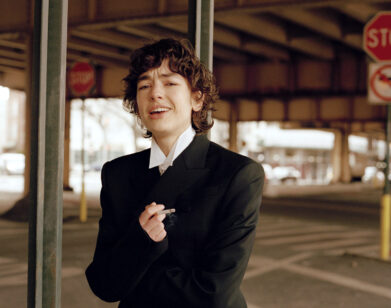Ben Lerner


BENJAMIN LERNER IN NEW YORK, MAY 2014. JACKET: BERLUTI. SHIRT: LOUIS VUITTON. GROOMING PRODUCTS: TOM FORD, INCLUDING OIL-FREE DAILY MOISTURIZER. SITTINGS EDITOR: JESSICA DOS REMEDIOS. GROOMING: ENRICO MARIOTTI FOR SEE MANAGEMENT.
“It just seems cowardly, given the kind of writing I’m interested in, not to risk the personal, but also equally cowardly not to then transcend it. BEN LERNER
“I decided to replace the book I’d proposed with the book you’re reading now, a work that, like a poem, is neither fiction nor nonfiction, but a flickering between them.” So the protagonist pronounces toward the end of Ben Lerner’s second novel, 10:04. For anyone who read Lerner’s outstanding first novel, 2011’s Leaving the Atocha Station, about a young poet on a fellowship in Madrid, such fierce wranglings with reality and fiction and the artist’s head inside the flights of the collective mind should have been expected.
The 35-year-old, Brooklyn-based writer is perhaps unsurpassed in inhabiting the weird, porous spaces of the body and mind, where sensations, thoughts, paranoia, miscommunications, and the somewhat harder facts of the material world seem to slide into each other to create a dazzling portrait of consciousness. If Atocha was brutal in its treatment of a fractured character, 10:04, out this month from Faber and Faber, not only brings the psychological war home to the streets of New York City but offers a subtler and more hopeful perspective. The narrative revolves around a young man, buoyed by the surprise success of his first novel and, having just landed a robust book deal, struggling to negotiate personal, social, and professional land mines, and as the above quote suggests, it is very much the novel about the making of the novel. In clumsier hands, this conceit would feel self-consciously postmodern. But Lerner, with his keen poetic eye, manages to fill 10:04 with deft, breathtaking observations and possibilities. Here, fears of memory, time, and futility blend with the more immediate anxieties of parenthood, artistic credibility, environmental destruction, late capitalism, and physical health—the narrator is diagnosed with a potentially fatal heart problem. The bones of dinosaurs jockey with Christian Marclay’s iconic film-montage artwork that makes up a 24-hour clock, and the erased dreams of sending a teacher into outer space (the Challenger disaster) compete with a hurricane that paralyzes Manhattan. If indeed, as many postmodern critics tell us, there is no longer the prospect of the certified masterpiece or the Great American Novel, Lerner has created a meaningful substitute: a thinking text for our time or a human shape that is either fading out or just coming into being.
I met up with Lerner for lunch in SoHo this past May. I waited until my last question to bring up the power of disasters.
CHRISTOPHER BOLLEN: Like one of the characters in your book, I once had my wisdom teeth taken out but didn’t have the insurance to pay to be put under. I’ll never forget the sensation of my teeth basically crowbarred out of my jaw.
BEN LERNER: And the incredible amount of leverage the dentist uses—it’s like carpentry. It’s brutal. In De Quincey’s Confessions of an English Opium-Eater, the writer makes excuses for his opium addiction versus Coleridge’s opium addiction by saying something like, “We both had rheumatism, but I had rheumatism and tooth ache.” Like, anybody who’s had tooth pain understands why you would destroy your life with any drug. I don’t understand evolutionarily why teeth should have nerves in them.
BOLLEN: I used to believe that at age 18, everyone should be admitted into the hospital and get every vestigial, potentially malfunctioning body part removed—appendix, tonsils, wisdom teeth, maybe even adult teeth for a titanium set …
LERNER: It’d be hard to know where to stop.
BOLLEN: True. Okay, no more sidetracking. Your first novel, Leaving the Atocha Station, was published in 2011, and its success was one of those rare examples of from-the-ground-up admiration. I remember hearing about Atocha from artist friends before I ever read a review or saw a sign in a bookstore. Was the response a surprise to you?
LERNER: It was a total shock. I was really resistant to the idea of even writing a novel. I had an idea that it was a betrayal of the poetry to which I was committed—or whatever. I also just didn’t know if I could do it in the right way. I had fun with the narrator of Atocha himself having this resistance to writing a novel. But honestly, I didn’t think anyone would read the book except for poets, who would read it as a kind of weird demonstration of what could happen if a poet took the resentment that a lot of poets have for their own practice and made it a fixed idea and watched it spread out into this character’s life. I didn’t think it was going to get any attention outside of that.
BOLLEN: But Atocha is very much a novel in its scope and structure—it isn’t narrative poetry.
LERNER: It’s totally a novel. It’s not a poet’s novel, which is like a 400-page prose poem. It’s a very traditional, if vaguely European, novel. It has this very old novelistic idea that you achieve authenticity through a kind of ruthless, anti-heroic approach to all the lies that make up social life. The character is very concerned about all that. Questions about what counts as an authentic aesthetic experience is the oldest novelistic question. And so often poets figure largely in those novels. It’s like a Künstlerroman, a story of a young artist. So it is very traditional, but I was resistant and kind of scared about writing it. I gave it to a small press to publish. I was shocked not just by the fact that the attention tended to be very positive, but just to see the book taken up. I do think there’s something about the figure of the poet, which in a culture that has so much contempt for poetry, is actually interesting to people …
BOLLEN: There’s the myth of the poet as a beautiful, saturnine, misunderstood figure. But your poet in Atocha—Adam Gordon—isn’t really that. He’s more deceitful than misunderstood.
LERNER: It’s kind of debatable. But in the Goodreads reviews of it, there is some fury and disdain and disgust, especially around the questions of likability.
BOLLEN: The likability of the character—the old complaint.
LERNER: I find it to be the most asinine part of the conversation. But there were other complaints: there’s no plot; nobody ever recovers from a grievous injury.
BOLLEN: There’s no redemption.
LERNER: Right. If there’s no clear redemption, there’s a real anxiety produced among those readers who have an expectation that an unambiguous transformation in the life of the protagonist has to be what happens in fiction and that anything other than that is kind of a crime against the ideology of the novel. So one of the interesting things about the novel getting attention was to see these weird experimental encounters that normally don’t happen. And you can read them because people will tweet their hatred. I mean, you wouldn’t have any access to this stuff before the internet.
BOLLEN: Now you’re on to the second novel—at a major house. Do you feel you’ve altered from poet to novelist, or at least felt the pressure to continue on as a novelist, because that’s a much smoother, well-paved road than poetry?
LERNER: I don’t feel a pressure. I’ve been a poet for a long time, and then I was suddenly a debut novelist. For me, this “second book” feels like a fifth book. But writing for me is so much about what feels possible in the moment and that moment is determined by all kinds of forces. It’s not a pure moment, but it’s not a moment I can control. So I don’t sit down and choose each day, “I’m going to be a poet,” or “I’m going to be a novelist.” There’s this long poem that’s excerpted in the Marfa section of 10:04. I wrote that poem, not having any idea that this novelistic frame was going to go up around it. It was very much, “Now I’m writing poetry again,” and I was writing poetry, and I am writing poetry. I wrote that poem, but then the novel happened. It’s the same about the section of the novel that mentions salvaged artworks—
BOLLEN: That was from a Harper’s article you wrote.
LERNER: Exactly. It was something I was writing as criticism that became a kind of solution to a problem in the novel that I was already writing. So, the genres are in this mutually constitutive practice, or echo chamber, that I’m not really in control of. But what I do love about the novel is that it can assimilate all these different modes of writing.
BOLLEN: There’s the making of the book inside this book—at least a fictional coming to terms with writing a second novel on the part of the narrator. And originally that book was going to be about a character who falsifies correspondence with famous authors to sell as an archive of letters.
LERNER: Yes, I started writing about that, but then I didn’t want it to be a novel. The idea interested me, but it felt moribund and I didn’t exactly want to write another novel about fraudulence. I was actually going through all this health shit and it just felt dark in a bad way for me, some of which shows up in the novel. So I published it as a story in The New Yorker and said, “I’m done. I’m going to write poetry.” There’s a part in the new novel about fertility treatments—my wife and I didn’t have fertility treatments, but we had this long shit that I won’t get into. I just thought, “All these issues about raising children, and is literature going to have a role in that economically? How do you let that stuff into your book, or does this stuff show up in writing, or do you ban it?” This complex of issues in my life started to make me interested in the idea of going back to the original story and writing around it—like imagining someone who was debating whether or not to write the novel I had decided not to write. Then all these other concerns started to come together in the idea of someone figuring out how to turn from a novel that depressed him into a project that felt more affirmative of life and could hold more of his own experience. I was also trying to figure out, what does it mean for literature to reckon with all these anxieties about mortality, the fragility of the planet, the contradictions of reproduction, and the economic side of literary production? Like, instead of making those issues a mysterious thing, what would it be like to say, “I want to write a novel in part to impregnate my friend through really expensive fertility treatments.”
BOLLEN: I like the honesty of your narrator naming how much his book advance was. Roughly $270K after his agent’s cut and taxes.
LERNER: He gets more money than I got. [laughs]
BOLLEN: What about the ongoing confusion in both novels as to what is fiction and what is pulled from your biography—I’m sure you’re sick of readers asking you if you are that jerky, pill-popping guy in Madrid like your character in Atocha, but certainly a part of you is inviting that confusion.
LERNER: It just feels like an inevitable problem. On the one hand, there are all these ways these narrators are clearly not me—ways that aren’t clear to a reader who doesn’t know me necessarily. Like, I lived in Spain with a woman who’s now my wife. And in terms of 10:04, I never tried to get my best friend pregnant. But you can feel exposed too because people will want to know what’s you and not you.
BOLLEN: So what do you think that author/protagonist confusion achieves?
LERNER: It’s essential for me to get at what I’m most interested in in fiction—which is like how do we live by fictions? Or how do fictions have real effects? Which is a big theme in this book. There are notable exceptions, but for me, fiction is most powerful when it feels enough like the world and enough like yourself that the differences are really charged. So I have to kind of hew close enough to experience and identity to be able to fuck with those things in a way that feels powerful to me. It has to be very personal in order to be impersonal in a way that counts, right? The other thing is that the blurriness of the boundary between art and life is the theme of so much art that the way you do that in the book is in part by inviting that conflation. But that’s not to say that I’m interested in writing blogs about all the shit I do or putting on Facebook, like, “Here’s a picture of what I ate,” or “This is my sexual life.” I feel like you can still be private about those things. The question is about how you gather in the book the energies that are produced by the conflation of fact and fiction. What’s the role of the imagination in lived experience? What’s lived experience’s limits?
BOLLEN: It’s a confusion that rarely occurs in visual art. Visual art hardly enters the vein of real experience because we as the audience always understand the frame—this is a gallery, and art happens inside but not outside. Interestingly, you’ve managed to create this conflict in a book, even if the result is that many readers will take it for a thinly veiled memoir.
LERNER: This is what the book is about in part—the way our lives are confusions between imaginative structures and real forces. For me to do that, I need a first person that is intensely felt to move across the levels of fiction. There’s no way for me to do it without inviting that conflation of fact and fiction. The danger is that people who want to hate the book will say, “Oh, it’s really narcissistic because he writes about himself and he’s a white guy in Brooklyn.” But this is also a book very much about emptying the self out in this manic way and trying to imagine fiction as a space of transpersonal imagination. What does it mean to think of the self as a multitude?
BOLLEN: Your interest in the multitude explains the influence of Walt Whitman throughout this book. I have to say the main character in 10:04 is an older and less nihilistic character than the one in Atocha—not that I believe in the moral evolution of character. But there does seem to be a spirit in 10:04 on the side of hope.
LERNER: This book is less about being in one character’s ruthless monologue and more about the possibility of a collocation of different voices and different experiences. He’s trying to imagine lateral community and longitudinal community, a relation to others and a relation across time. For better or for worse, I think of this book as an invitation to a certain kind of participation on the reader: Think about these things with me. Can you see this?
BOLLEN: One of the best things about Atocha is the sense of confusion or failure of communication that a visitor to a foreign country faces. For 10:04, though, it’s in New York. You’re on your home turf—it’s a turf of expensive meals with agents and volunteering in a Brooklyn food co-op.
LERNER: I needed that diversity of experience—like tutoring a kid who is scared about global warming. I wanted to show a New York that is just as contradictory and uneven in terms of its successes and deprivations. I didn’t want to write the New York that’s just the literary Brooklyn, New York, which is not the New York anybody really lives in if their eyes are open. [looks across restaurant] That guy looks like Picasso. Or a Mel Brooks-Picasso synthesis. [Bollen laughs] For Atocha, foreignness is an issue in that he’s in Spain, but it’s also all in his head. The point is that he can’t escape himself wherever he goes. In 10:04, the narrator sees the task of writing this novel, or not writing it, this book that’s really about his life, this book you end up holding. For the narrator, it’s like he almost moves from fiction to nonfiction. It just seems cowardly, given the kind of writing I’m interested in, not to risk the personal, but also equally cowardly not to then transcend it and to try to think about a choral, multi-voiced attempt or, in this case, the experience in New York.
BOLLEN: I want to propose something: It seems to me that in the 2000s, white, straight, male writers seemed to be devoted to a kind of ribald, cafeteria-table, super-clever, absurdist writing style—that was the novel of the time, which was rather quickly coopted by sitcoms. Right now, there seems to be a different wave emerging: straight, male writers who are blurring fact and fiction by writing books that mimic or mirror their own lives. I’m thinking everyone from Karl Ove Knausgaard to Edward St. Aubyn, from Tao Lin to yourself. Do you see any connection here?
LERNER: It interests me, especially if there are certain moments that are so suspicious of fiction that they kind of insist on the mundane or the biographical. I think that’s an interesting question about a cultural moment and I feel like part of that moment. Knausgaard’s My Struggle is an amazing, weird thing, although I think we’re incredibly different. He really positions his work as an anti-literary project in a certain way, right? He’s not going to write novels. He’s just going write down everything that ever happened to him, and of course that’s a fiction. He’s making decisions and shaping things. There’s some of that in the fiction I’ve written, but I think that this book is really interested in something that Knausgaard or Tao Lin don’t seem interested in. Which is, precisely, the power of a kind of fiction making, a kind of imaginative energy. It isn’t an anti-literary project. Knausgaard wants to destroy fiction, which is its own traditional literary mode in a certain way.
BOLLEN: The Death Schools.
LERNER: This book wants to transgress conventions, but I think it’s celebratory of art and literature. It’s not this traditional avant-garde thing: We must destroy art; we must destroy literature.
BOLLEN: I was unnerved to find out in 10:04 that the brontosaurus isn’t a real dinosaur. I was still living under the assumption that it was.
LERNER: Yeah, that and Pluto. Gone.
BOLLEN: You also make use of the 1986 Challenger explosion—I can remember being in fourth grade. You point out that most of us who say we watched it live are misremembering. And yet it feels like we all watched it live.
LERNER: It’s our generation’s first experience of a televised trauma, and trauma is always in the present tense, right? So you always saw it live. It’s always live. The shuttle’s always blowing up.
BOLLEN: I can remember the Y shape of the explosion and also Nancy’s face, with Ronald next to her—watching and then slowly realizing what happened. But maybe I’m inventing that memory? Was Nancy watching?
LERNER: Well, their faces are made to be invented in memory. They’re screens.
BOLLEN: One of the visual-art cameos in 10:04 is Christian Marclay’s The Clock. In fact, the book title references a scene Marclay took from Back to the Future—the time where the lightning strikes the clock tower, enabling Marty to travel forward in time. The Marclay reference is beautiful because it possesses both fictional and nonfictional elements—the video is a clock, it actually functions, but all of the timepieces are from fictional films.
LERNER: The Clock is this total real-time event that also, to me, represents a kind of triumph of fictional time over real time, because you watch this thing that’s exactly as long as a day, right? It is measuring real time, but at the same time, it has this whole different overlapping set of fictional temporalities where you keep reinventing stories as you go. And what’s bizarre about it is that it’s an artwork filled with the collective unconscious that is the cinema. It’s like a day made out of a million different imaginations. In part, it’s limited by the genres of cinema, but it’s also like, when do we or how do we collectively and in composite represent the rhythms of the day? I think Whitman would have really admired that work.
BOLLEN: I also think it’s particularly poignant for our generation who came of age with the VCR. You didn’t have to obsess about a whole film anymore; you could press rewind and obsess over a single scene. It reminds me of that Karen Kilimnik piece where it’s just scenes from Heathers rewound and played, over and over. We’ve shrunk our fascination down to the clip.
LERNER: It just occurs to me now that one of the things I probably like about The Clock is how much it uses video to depict outmoded measures, like watches. It’s kind of like the way that I love poetry in part for its anachronism as opposed to always rejecting the claim that it’s anachronistic. What are these older technologies? It’s kind of a very new media celebration of older ways that count time across time.
BOLLEN: My phone died the other day while I was out and I realized there are no such things as public clocks anymore. They basically don’t exist in Manhattan.
LERNER: The world’s become a casino. You’re not supposed to know the time when you’re shopping.
BOLLEN: Your character goes to Marfa and doesn’t see the famous Mystery Lights. I want to say on record that the Marfa Mystery Lights do exist. I saw them one night. They’re these odd, colored bubbles that rise in the distance. I’m not making this up.
LERNER: No, people see them. I actually never went to look. But they’re clearly something. There’s also something interesting about the idea that maybe they’re our own reflected light pollution, that we’re basically worshipping this kind of self-created illumination. That would be an example of a meaningful fiction. It doesn’t really matter if the Marfa Lights are supernatural or reflected light. You’re going to look at something mysterious and powerful that’s bigger than any individual decision and it puts you in touch with a kind of collective mystery. Just because it’s fictional doesn’t mean that it can’t have real effects—that it can’t produce real thinking or feeling.
BOLLEN: We could talk about how the art world has become a fucked-up or at least questionable arena for social value—or at least values that aren’t financially minded. But I wonder, in general, how you see art working in 10:04, mixed in with all of the other sights and sounds that come in and out of the narrator’s experience.
LERNER: This narrator is in New York, and thinking about art and capitalism is everywhere in its most explicit form, and he’s caught up in that. He’s getting a book advance, but capitalism is also fragile in these new ways, and all these different modes of existence feel a little bit up for grabs. But, as I see it, art helps return his experience to wonder before the world, the wonder before the instant coffee, the wonder before a certain artwork or a certain object or the overpriced octopus, even, that says, “This is not natural. This is not inevitable. This is fragile and bizarre.” The question of value and the question of futurity are live questions as long as we avoid a sort of complacency, either the complacency of uncritical celebration or total nihilism.
BOLLEN: Complacency is such a default mindset in Manhattan. It takes something like the hurricane to topple the power grid in order to break out of it.
LERNER: There can be this perfect lubricity in New York, where you’re sliding across the city and the trains come on time and everyone looks beautiful or bizarre. But there are simultaneous experiences of majesty and stupidity and beauty here. The highs and the lows are so extreme, and it feels just like this symphonic picture of the range of human experience, and you’re just caught up in the motion of it.
BOLLEN: It’s often more about the motion—or the speed—than the connectivity.
LERNER: A lot of that is about money. Frank O’Hara is an example of a poet who wasn’t ashamed or too experienced to be embarrassed about a feeling of wonder before the sheer, undifferentiated, contradictory, massive experience. Even though we live in a much more standardized New York than O’Hara’s New York, that’s still all here. That’s a real and political thing to be able to harbor and promote a position of wonder before the material world, as opposed to just either being a moron financier or a moron nihilist who can only stick his head out to say, “You’re corrupt. You’re all doomed. Everything is pointless.”
BOLLEN: My last question for you involves disaster. The 2004 Madrid bombings occur in the second half of Atocha. 10:04 ends in the aftermath of the 2012 Sandy hurricane. What is inherent in disasters that interest you?
LERNER: One thing is that disasters are ruptures in narratives and moments of re-narrativization. Like the power has fallen, now what kind of a world do we live in? And we re-create the world we live in—the post-this and pre-that. After something like that has happened, it’s like living in a new time. Basically, those big moments are invitations to fictional redescription when everything feels up for grabs. And they’re also moments of intense utopian social potentiality that then tend to get hardened back in disaster capitalism. Like, New York is one fabric. You’re one country. You’re one world. You’re one whatever—and then that’s assimilated to the latest neoliberal project, to go bomb the shit out of some other country or to privatize more territory or whatever. But I think the wake of a disaster is a moment of fictional contestation. Like, now what kind of a world is it? That’s also true personally on a more micro level. Like your father was never the same after this or that happened. But instead of a protagonist undergoing nuclear change, I’m more interested in the way that a collective fiction has the possibility of undergoing a change for better or for worse.
BOLLEN: I hate the whole concept of “You really find out what kind of person you are during an emergency.” I actually feel like that’s the one moment you can be anything—or at least free to act crazy. Like, “No, it’s the one moment I don’t have to be who I am.”
LERNER: Well, part of that links to Atocha, where there’s a sense of, did the bombings happen to him? Who did they happen to and who didn’t they happen to? And there’s this kind of collective spectacularization and flattening of disaster. The strange thing about the apocalypse is that it’s uneven. For some people, it goes one way and for other people another way, so that there’s always this shifting relation to the narrative of the disaster. Sometimes apocalypses are just fictions, they’re just structural fictions and sometimes they’re real. Sometimes a narrative requires an end—the fact that the beginning was always leading somewhere becomes clear at the end. There’s an idea that we’re actually always in the middle, but we posit this apocalyptic end in order to also be able to project into the past or the beginning. I think that’s probably true and false. I think it’s true, but on the other hand I think nuclear weapons and ecological catastrophe are real. Part of what happens in 10:04 is that there are all these different potential apocalypses, like his heart condition or the death of literature or the death of the city or the triumph of capitalism. Everyone is shot through with the possibility of fragility, and it’s all about the different ways the present feels based upon what kind of apocalyptic moment you project. How you picture the end is going to totally determine your experience of the present. But if I write a third novel, I think I’ll try to write one without disasters.
CHRISTOPHER BOLLEN IS THE EDITOR AT LARGE OF INTERVIEW MAGAZINE. HE IS ALSO A FICTION WRITER. HIS SECOND NOVEL, ORIENT, WILL BE RELEASED BY HARPER IN APRIL 2015.






